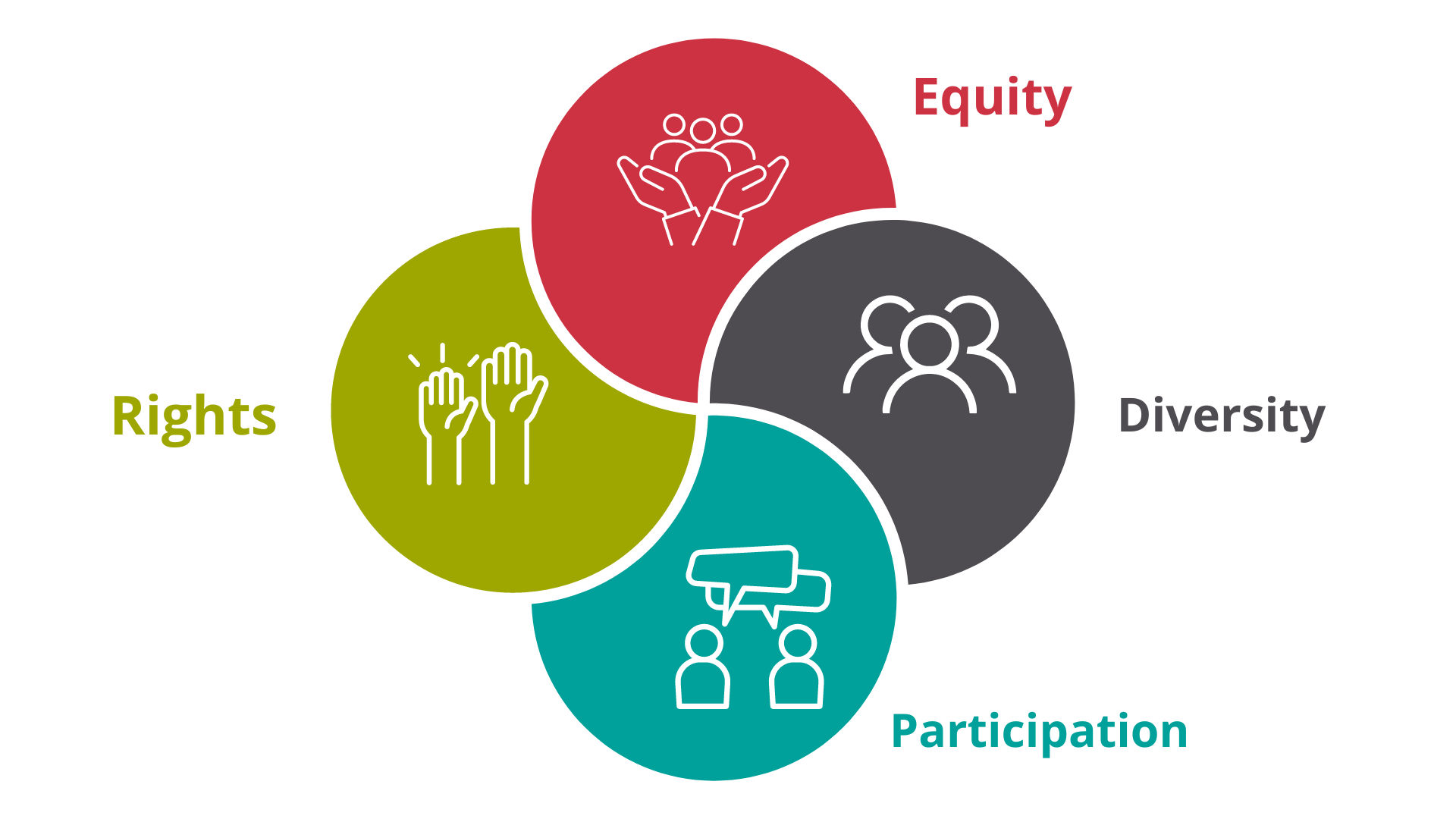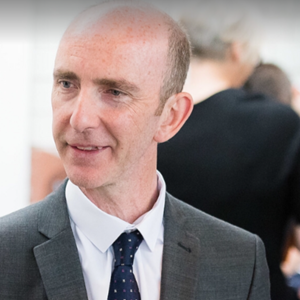Equity, Diversity, Participation and Rights
We believe that building our know-how and making progress towards equity, diversity, participation and rights (EDPR) are critical for delivering our mission. Find out more about how we are embedding EDPR across our work.
We believe that building our know-how and making progress towards equity, diversity, participation and rights are critical for delivering our mission.
We want our progress to be measured by change, and we encourage feedback, challenge and ideas from everyone we work alongside.

What do we mean by Equity, Diversity, Participation and Rights (EDPR)?
Promoting Equity
We seek to develop opportunities and promote better outcomes for people who have been impoverished, excluded and marginalized for different reasons, including discrimination.
Valuing Diversity
We recognise and value differences. Having diverse experiences woven into decision-making and our workforce being representative of all our partners will make our work stronger.
Promoting Participation
Genuine participation goes far beyond consultation. We believe that participation is the key to unlocking effective solutions to poverty and trauma. We will ensure diverse voices actively shape both the questions we ask and how our decisions are made. Increasing and deepening the participation of experts by experience will help to narrow the distance between the Trust and the people and places we are here to serve.
Advancing Rights
Everyone is entitled to have their fundamental human rights secured, underpinned by values of dignity, fairness and respect. Working to ensure that everyone can access these rights in reality is central to our mission.
Why does EDPR matter to us?
We know that not everyone has the same opportunities. The Scottish Government’s Best Start Bright Futures Plan (2022-26) to tackle Child Poverty told us that children in Black, Asian and Minority Ethnic households, lone parent households and households with disabled people have much higher rates of poverty than others in Scotland.
People from ethnically minoritized groups in Scotland are more than twice as likely to be living in relative poverty after housing costs than White Scottish or British people. Analysis of DWP records in Scotland found that 44% of people from ethnically minoritized groups live in poverty compared with 18% of White people (JRF Briefing: Ethnicity, poverty, and the data in Scotland).
We also know that often people face interconnected and overlapping forms of oppression according to their race or ethnicity, nationality, gender, sexual orientation, disability status, age, religious beliefs and other characteristics.
We cannot reduce and prevent poverty and trauma without a sharp analysis of how these issues affect population groups in highly unequal ways and an understanding of what this means today for Scotland’s diverse communities. We believe that working alongside diverse people and places, and bringing lived and learned expertise together, is the most powerful way to co-design lasting solutions to the unequal risks and burdens faced.
That is why it is crucial that we include Participation and Rights at the forefront of our actions, alongside Equity and Diversity. Many people feel their voices are not heard or listened to and that their lives are impacted by decisions which they have not been part of shaping. Change needs to be shaped by diverse communities. We also know that while progress has been made through human rights legislation in Scotland, work to ensure that everyone can access these rights is still considerably underdeveloped and underfunded.
That is why we frame our work as Equity, Participation, Diversity and Rights. We believe progress on all four of these fronts together is required for lasting social change.
Our EDPR Journey so Far
Our early thinking on EDPR was brought into sharper focus following the Association of Charitable Foundations’ report Diversity, Equity and Inclusion: The Pillars of Stronger Foundation Practice. We used this as our framework to get started, and we have since developed an action plan to make sure that our words are lifted off the page to achieve measurable and sustained progress towards our aims.
In 2021, we formed an EDPR group drawing on skills and experience from across The Robertson Trust. The purpose is to embed EDPR as a lens to drive action across all our work, with a particular focus on our primary themes:
Our cross-team EDPR group is currently formed of 16 members of staff. Our Chief Executive, Jim McCormick, chairs our EDPR group and reports on progress to our Board.
In 2022, our EDPR group chose three priorities to focus on initially: advancing racial justice, participatory approaches, and human rights-based funding.
You can read more on our work so far on our three workstreams below.
In 2022 and 2023, we undertook an all-staff active learning programme with Viana Maya from pRESPECT, consisting of three workshops on Anti-Racism and Allyship (ARA). Based on this we developed an Anti-Racism and Allyship (ARA) action plan mapped to the Trust's objectives to Fund, Support and Influence. Our plan includes: creating an accurate baseline of how far our funds are reaching minoritized communities; supporting our diverse community of Scholars; demonstrating transparency by sharing our work aloud as we go; amplifying the voices of racially diverse grant holders and partners; co-designing new funding approaches; and improving diversity among our staff and Board members.
In 2023, we had conversations with people leading community-based initiatives by and for black communities and communities of colour in Scotland, learning more about what needs to change and how we could play a more effective role in advancing racial justice. In October 2023, a workshop on Advancing Racial Justice: how we can work together? laid the groundwork for further work in 2024. If you are interested in finding out more about this work, please contact us.
For the past year, we have been building a deeper understanding of participation and we have started to develop relationships with people with direct, diverse experiences – both through their lives and work – of the issues prioritised in our strategy. This Experience Group has agreed to work with us on shared priorities during 2024 on a test-and-learn basis, continuously reflecting and sharing our learning as we go.
The Independent Human Rights Fund for Scotland is hosted by the Corra Foundation and supported by a partnership of funders: AB Charitable Trust, The Baring Foundation, The Binks Trust, Cattanach, Corra Foundation, The Robertson Trust and William Grant Foundation. The Robertson Trust is delighted to be a Founding funder of the new Fund, contributing £400,000 plus a share of running costs over the next three years.
The Fund will:
- Enable organisations working in Scotland to close the gap between policy and practice, and the lived experience of people whose rights are most at risk.
- Help unlock the power of people, communities and organisations to name and claim their rights and hold duty bearers to account.
- Create conditions for a strong human rights sector in Scotland.
See our recent news posts here for more information:
> New Independent Human Rights Fund for Scotland | April 2024
> New grants to defend human rights in Scotland | December 2024
Being Accountable and Open
We will strive to act with integrity as we learn from the experiences of others and seek to learn what we don’t know. We know that we will not get it right every time, but we commit to sharing our progress and our learning with the purpose of contributing to ambitious actions to advance equity, diversity, participation and rights within our communities.
We want to listen to and learn from those whose perspectives and experiences have too often been excluded. We will continue to build our connections and knowledge consciously, as we come to recognise more fully the deep and enduring inequalities in power and voice of different communities.
We are a signatory to the IVAR Open and Trusting Grantmakers pledge and are committed to working more transparently.
We commit to sharing updates on our actions, where we make progress and where we don’t, communicating through diverse and accessible platforms, including our website, annual reports, and our social media.
Contact Us
We are always keen to learn and welcome feedback on our EDPR approach and plans.
If you’d like to find out more or chat with us, please drop us a message at TRTComms@therobertsontrust.org.uk.


